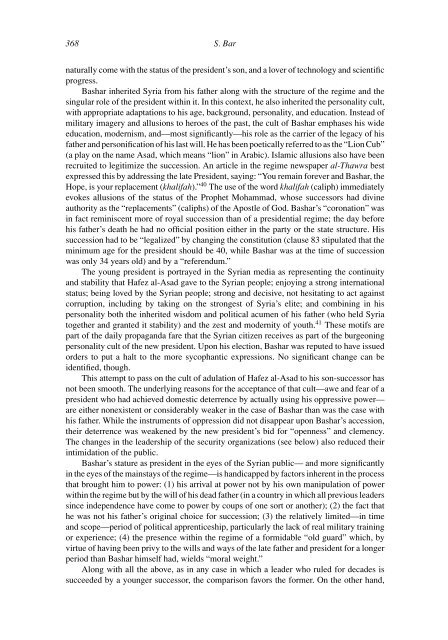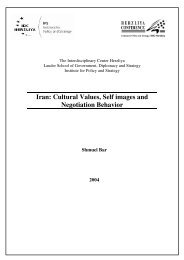Bashar’s <strong>Syria</strong> 367“achievements” of the regime <strong>and</strong> alienate the elite. <strong>The</strong>re are, however, also fundamentaldifferences. Over the decades, the regime’s apparatus served more as an instrument for theimplementation of policy than a mechanism for policy formation. Under Bashar, however,this apparatus has taken an increasingly pivotal role in the formulation of decisions.Bashar al-Asad ascended to the office of President of <strong>Syria</strong> upon the death of his fatherin June 2000 at the age of 35, after six years of grooming after the death of his father’spreferred successor, his brother Basil, in a car accident. While there is little comparison in<strong>Syria</strong>n political circles between Bashar <strong>and</strong> his late brother, he is constantly being appraisedwith reference to his father’s shadow. Hafez al-Asad was perceived as a leader with a clearsense of history <strong>and</strong> strategy, who calculated his moves <strong>and</strong> their consequences years <strong>and</strong>decades ahead. <strong>The</strong> most devoted Asad watchers cannot remember a decision on his partthat was taken impulsively or without careful assessment, calculation, <strong>and</strong> preparation forthe long-range implications. It is mainly in this trait that Bashar is found wanting. Hisreactions to pressure both from within the regime <strong>and</strong> from the international community areoften seen as rash <strong>and</strong> “tactical.” He is seen by many as more impulsive than his risk-aversefather, <strong>and</strong>, at the same time, more insular due to his lack of h<strong>and</strong>s-on political experience,merely aiming to survive <strong>and</strong> without any clear strategic concept. 38Despite his image as a young <strong>and</strong> Westernized individual, Bashar’s assimilation ofWestern ideas could not have been very deep. He attended <strong>Syria</strong>n schools in the earlydays of the Ba’th regime. A perfunctory reading of the textbooks from which Bashar mostprobably gleaned his knowledge of history, international relations, <strong>and</strong> regional politicsshows a two-dimensional world composed of the brave <strong>and</strong> noble Arabs <strong>and</strong> evil <strong>and</strong>conspiratorial colonial powers <strong>and</strong> Jews. When he came to the United Kingdom it was tospecialize in ophthalmology. His courses did not provide insights into Western conceptsof philosophy, government, or international relations, <strong>and</strong> his study load made interactionwith local culture sparse. In any case, to the extent that he was exposed to Western thought,it was when he was already an adult, with preshaped political ideals <strong>and</strong> values.Before the death of his brother, Bashar was little known to the <strong>Syria</strong>n public. He wasnot the object of the personality cult that was cultivated around Hafez al-Asad <strong>and</strong> his heirapparent, Basil. <strong>The</strong> fact that he was not even provided nominal military training beforebeing sent to gain a higher education as a medical doctor (the profession that his fatherhad aspired to but ab<strong>and</strong>oned in favor of a military career) was also indicative of his beingprepared for a life of obscurity <strong>and</strong> not expected to play even a minor role in the regime(in contrast to monarchies like Jordan, in which all sons <strong>and</strong> daughters of the royal familyare groomed in one way or another for royal functions). It is a moot question whether hispersonality was the cause or the result of his being distanced from public office.Some observers note that Bashar’s profound need to prove that he is worthy to fill theshoes of his father is linked both to the fact that he was his father’s second choice <strong>and</strong>to his own rather distant relationship with his father. In contrast to his two elder siblings,Bushra <strong>and</strong> Basil—who had for some time a father who had not yet been recognized as anational icon <strong>and</strong> mythological figure—Bashar was born on 11 September 1965. When hewas five years old, his father was already president of <strong>Syria</strong>. Indeed, when Bashar mentionshis father in public, or frequently even in private, he does not refer to him as “my father,”but as President Hafez al-Asad.Until assuming the office of president, the only formal position Bashar al-Asad heldwas chairman of the <strong>Syria</strong>n Computer Society. 39 Nevertheless, he began to wield a degreeof informal power under the watchful eyes of his father’s advisors. <strong>The</strong> <strong>Syria</strong>n propag<strong>and</strong>amachine projected an image of Bashar as a modest, unassuming, introverted intellectual,gentle, <strong>and</strong> polite, a hard worker who avoided the special attention <strong>and</strong> privileges that
368 S. <strong>Bar</strong>naturally come with the status of the president’s son, <strong>and</strong> a lover of technology <strong>and</strong> scientificprogress.Bashar inherited <strong>Syria</strong> from his father along with the structure of the regime <strong>and</strong> thesingular role of the president within it. In this context, he also inherited the personality cult,with appropriate adaptations to his age, background, personality, <strong>and</strong> education. Instead ofmilitary imagery <strong>and</strong> allusions to heroes of the past, the cult of Bashar emphases his wideeducation, modernism, <strong>and</strong>—most significantly—his role as the carrier of the legacy of hisfather <strong>and</strong> personification of his last will. He has been poetically referred to as the “Lion Cub”(a play on the name Asad, which means “lion” in Arabic). Islamic allusions also have beenrecruited to legitimize the succession. An article in the regime newspaper al-Thawra bestexpressed this by addressing the late President, saying: “You remain forever <strong>and</strong> Bashar, theHope, is your replacement (khalifah).” 40 <strong>The</strong> use of the word khalifah (caliph) immediatelyevokes allusions of the status of the Prophet Mohammad, whose successors had divineauthority as the “replacements” (caliphs) of the Apostle of God. Bashar’s “coronation” wasin fact reminiscent more of royal succession than of a presidential regime; the day beforehis father’s death he had no official position either in the party or the state structure. Hissuccession had to be “legalized” by changing the constitution (clause 83 stipulated that theminimum age for the president should be 40, while Bashar was at the time of successionwas only 34 years old) <strong>and</strong> by a “referendum.”<strong>The</strong> young president is portrayed in the <strong>Syria</strong>n media as representing the continuity<strong>and</strong> stability that Hafez al-Asad gave to the <strong>Syria</strong>n people; enjoying a strong internationalstatus; being loved by the <strong>Syria</strong>n people; strong <strong>and</strong> decisive, not hesitating to act againstcorruption, including by taking on the strongest of <strong>Syria</strong>’s elite; <strong>and</strong> combining in hispersonality both the inherited wisdom <strong>and</strong> political acumen of his father (who held <strong>Syria</strong>together <strong>and</strong> granted it stability) <strong>and</strong> the zest <strong>and</strong> modernity of youth. 41 <strong>The</strong>se motifs arepart of the daily propag<strong>and</strong>a fare that the <strong>Syria</strong>n citizen receives as part of the burgeoningpersonality cult of the new president. Upon his election, Bashar was reputed to have issuedorders to put a halt to the more sycophantic expressions. No significant change can beidentified, though.This attempt to pass on the cult of adulation of Hafez al-Asad to his son-successor hasnot been smooth. <strong>The</strong> underlying reasons for the acceptance of that cult—awe <strong>and</strong> fear of apresident who had achieved domestic deterrence by actually using his oppressive power—are either nonexistent or considerably weaker in the case of Bashar than was the case withhis father. While the instruments of oppression did not disappear upon Bashar’s accession,their deterrence was weakened by the new president’s bid for “openness” <strong>and</strong> clemency.<strong>The</strong> changes in the leadership of the security organizations (see below) also reduced theirintimidation of the public.Bashar’s stature as president in the eyes of the <strong>Syria</strong>n public— <strong>and</strong> more significantlyin the eyes of the mainstays of the regime—is h<strong>and</strong>icapped by factors inherent in the processthat brought him to power: (1) his arrival at power not by his own manipulation of powerwithin the regime but by the will of his dead father (in a country in which all previous leaderssince independence have come to power by coups of one sort or another); (2) the fact thathe was not his father’s original choice for succession; (3) the relatively limited—in time<strong>and</strong> scope—period of political apprenticeship, particularly the lack of real military trainingor experience; (4) the presence within the regime of a formidable “old guard” which, byvirtue of having been privy to the wills <strong>and</strong> ways of the late father <strong>and</strong> president for a longerperiod than Bashar himself had, wields “moral weight.”Along with all the above, as in any case in which a leader who ruled for decades issucceeded by a younger successor, the comparison favors the former. On the other h<strong>and</strong>,
- Page 4 and 5: Bashar’s Syria 355of political im
- Page 8 and 9: Bashar’s Syria 359a-Zur province
- Page 11: 362 S. Barof Lebanon, with which Sy
- Page 19 and 20: 370 S. BarSimilar behavior on the p
- Page 21 and 22: 372 S. Bardemocracy” must be foun
- Page 23 and 24: 374 S. Barcultural, political and m
- Page 25 and 26: 376 S. Barexcept for those with fam
- Page 27 and 28: 378 S. Barthe provisions for nonpro
- Page 29 and 30: 380 S. Bar The ups and downs in rel
- Page 31 and 32: 382 S. Barfamily is also linked by
- Page 33 and 34: 384 S. Bar2. The “second generati
- Page 35 and 36: 386 S. BarThe reformist trend withi
- Page 37 and 38: 388 S. Barwould allow the younger g
- Page 39 and 40: 390 S. BarFigure 3. Heads of the Sy
- Page 41 and 42: 392 S. Bar Disruption of the “hie
- Page 43 and 44: 394 S. Bar(Majlis Milli), composed
- Page 45 and 46: 396 S. Bar Other prominent Syrians
- Page 47 and 48: 398 S. BarSyrian civil society—su
- Page 49 and 50: 400 S. BarMany of the Muslim Brothe
- Page 51 and 52: 402 S. BarThese elements find reson
- Page 53 and 54: 404 S. BarIran’s proxy, Hezbollah
- Page 55 and 56: 406 S. BarWest—and specifically t
- Page 57 and 58: 408 S. BarBashar is well aware that
- Page 59 and 60: 410 S. BarBashar did not read these
- Page 61 and 62: 412 S. Bartoken withdrawal while ma
- Page 63 and 64:
414 S. Barlegitimacy had eroded. Ne
- Page 65 and 66:
416 S. Barin the wake of the al-Har
- Page 67 and 68:
418 S. BarIt was Russia, however, t
- Page 69 and 70:
420 S. Baror so, with competitive p
- Page 71 and 72:
422 S. Bar10. According to the well
- Page 73 and 74:
424 S. Bar44. See Flynt Everett, In
- Page 75 and 76:
426 S. Barinternet news site, all4s
- Page 77 and 78:
428 S. Bar100. As one Sunni Syrian
- Page 79 and 80:
430 S. Bar125. Radio Damascus, 21 O
- Page 81 and 82:
432 S. BarBengio, Ofra and Gabriel
- Page 83 and 84:
434 S. BarNews agencies and Newspap
- Page 85 and 86:
Regional Command;Central CommitteeR
- Page 87 and 88:
Main Figures in the Syrian Ba’th
- Page 89 and 90:
Main Figures in the Syrian Ba’th
- Page 91 and 92:
Main Figures in the Syrian Ba’th
- Page 93 and 94:
Main Figures in the Syrian Ba’th
















